#impact of social media on mental health of students
Explore tagged Tumblr posts
Text
Photography Draft






Twitter, Rediscover the past.
This is a group of photography collections I shot. Their theme is about Twitter, so I chose blue as the main color of the photography material. When shooting, I increased the exposure and used a variety of colors in the post-processing process filter to reflect the beauty of classical
0 notes
Text
bulletproof love (18+)
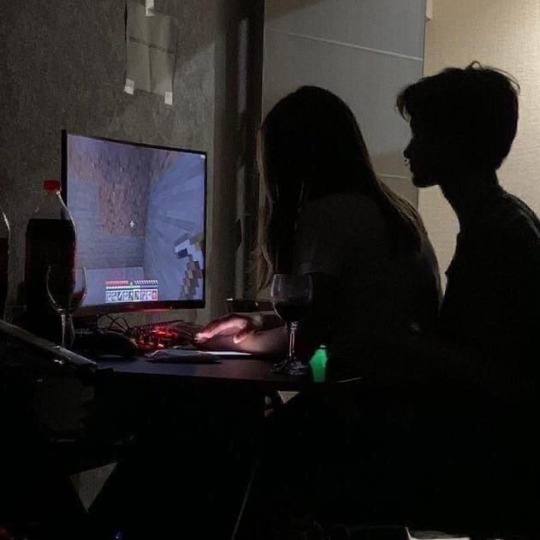
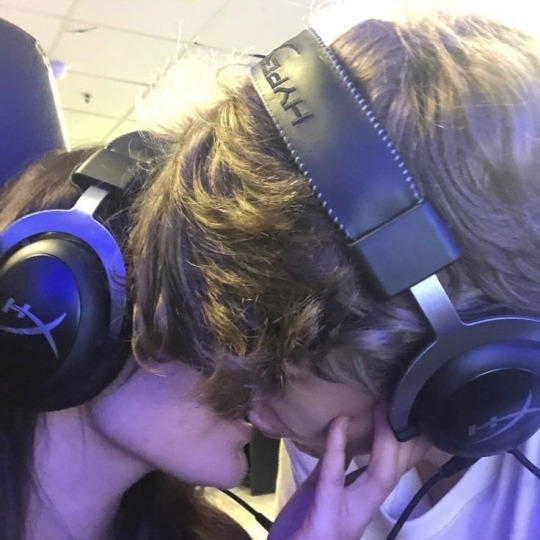
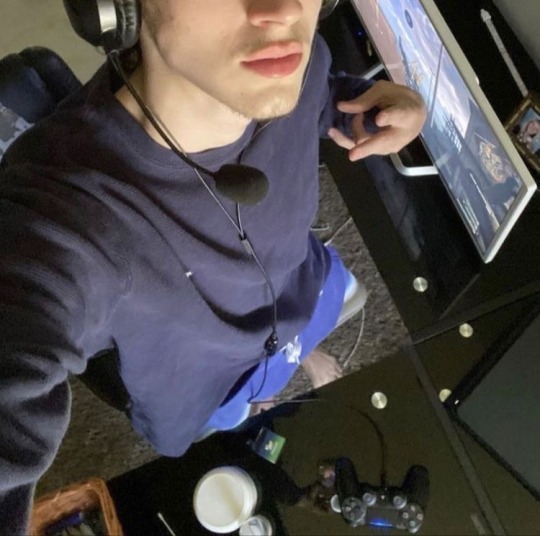
twitchstreamer!luke x reader
author’s note: omgg this oneshot took all my blood sweat and tears to produce. i am NOT a graphic designer. i do NOT normally write smut. but this idea had to come to fruition before i went insane. HOPE YOU ALL ENJOY!!!!
title is from bulletproof love by pierce the veil. lyrics have no correlation but it IS a certified banger.
tags/warnings: smut!! minors dni. oral (m receiving). use of y/n. not proofread. kinda long. teeheehee etc.

i.
You met Luke Castellan at the grocery store.
He looked like a completely normal (albeit, very attractive) guy in his twenties. His dark curls fell slightly over his warm, chocolate brown eyes. A mischievous smirk was plastered across his cheeks, showing off a small dimple on the left side. He wore a simple hoodie and sweats as he perused the pasta aisle, picking up different jars of sauce and reading the labels absentmindedly. He did, however, have an interesting scar sitting jagged over his cheekbone, but it was so faint that you hadn’t noticed it until way later on.
You would have never guessed he was a near millionaire with close to a million social media followers. You would have never guessed he spent the majority of his life not at the grocery store, but rather streaming FPS and RPG games for an average of fifty thousand views at a time.
You would have never guessed he’d take a liking to you.
You, who worked part time at this very grocery store. You, who didn’t really know the first thing about video games, except that they were confusing and it was insane that some people could build ridiculously complex structures at a mind-boggling speed on Fortnite whilst also shooting with godly precision.
He had backed into you accidentally whilst you were restocking a shelf, causing you to drop a couple glass jars that cracked open upon impact with the floor. You apologized, even though you’d really done nothing wrong. He obviously thought you attractive (or maybe he just didn’t leave the house much?) because his idea of an apology was taking you out to some lavishly expensive dinner the next night.
The dinner was okay but the conversation is what got you hooked. He was so sweet and told you so many wild stories that had you laughing until your chest ached. He paid for the meal and held your hand on the drive home. When he dropped you off, he casually told you his Instagram handle and told you to shoot him a follow. You blushed, smiled, and scurried inside.
You just about died when you saw his profile.
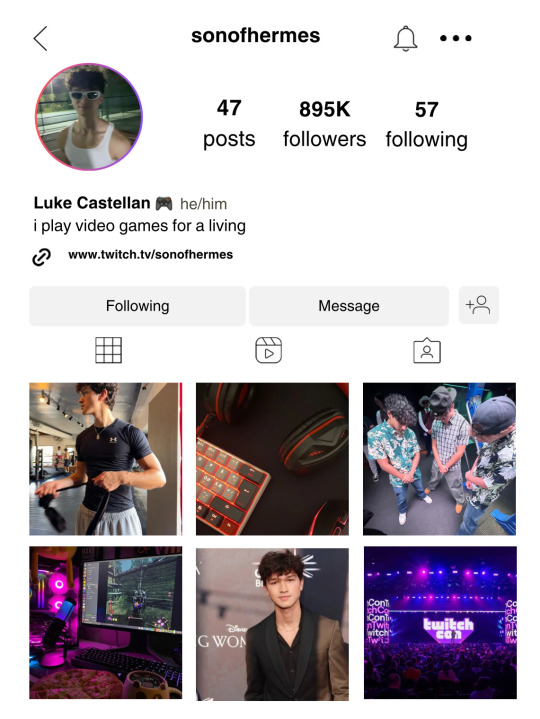
ii.
It’s been about a year since you had started dating Luke Castellan, otherwise known as his twitch handle “SonofHermes.”
(“Because he’s the messenger god, right? In, like, Greek Mythology? And I felt like a damned messenger god when I was a moderator for four different discord servers and a twitch chat—“)
Luke’s twitch streams occured mostly every night, from 8pm to about 3am. He always began his streams with some FPS game (Overwatch, Valorant, CS:GO, or something similar). After a few hours he would swap over to a different game for his variety segment. His chat was hilarious. They loved to tease Luke and joke around with him and donate silly messages. And, of course, because Luke was so very attractive, a decent chunk of his fan base was dedicated towards swooning over his every word and look and smile.
You, honestly, never really minded. Mostly because Luke was yours. You were sure the thirsting from chat would diminish once they knew you were dating. But… you really, truly, had no desire to be in the public eye. Having nearly a million people know your name and your face was daunting and scary. You also had enough common sense to realize that some of his fans were probably batshit crazy and would send you hate and death threats for dating Luke. You were a part time employee and a student; you did not need another reason on top of that to have poor mental health.
Luke loved you unconditionally and that was all that mattered. You were perfectly content spending most evenings to yourself. He was a good boyfriend, though, and did schedule days off to take you out and show you incredible amounts of love and support. You were both very happy and secure in your relationship.
One particular evening, you were staying over at Luke’s apartment. It was a Friday, and you had no work tomorrow, so he bought alcohol and weed and selected a list of movies to marathon. It was basically your most ideal way to spend the weekend.
That was, until, Luke’s gamer friends messaged him on discord, begging him to join their Rust server to defend their group base.
Luke had met these friends through Twitch events and game conventions. There was Percy, who streamed with his girlfriend Annabeth. They were one of the most adored couples in the gaming community. They all lived in the same state, so Luke hung out with them pretty often. There was also Grover, who was Percy’s roommate and would join his streams from time to time. As well, there was Thalia, who was a huge advocate for women in eSports, and played in a professional league. Luke had introduced them too you a few months ago, and they all swore to help keep your relationship a secret.
The five of them often played different games together, as most of their fanbases consisted of the same people, so it really raked in the views and made for good content. Plus, it was just really fun. You knew how much Luke loved his friends and cherished the times they got to play together.
The Rust server was a recent hyperfixation that you were positive would fade once a new MMO came out to grab their attention. But, you were also aware of how much time and effort Luke had spent constructing this base of his.
“Go,” you said, noticing his confliction. “You can have one hour to play. Stream, too, so I can watch out here. But after that, you’re mine for the rest of the night.”
“Yes, ma’am,” Luke said with his devilish grin. He kissed you hard, leaving a swarm of butterflies dancing in your stomach. He hurried off to his bedroom, where he kept his gaming setup, and shut the door.
You were fine with spending an hour alone. Flipping through Netflix, you cracked open a bottle of wine and relaxed into the sofa.
One hour went by fast. Luke didn’t return to the living room.
You picked up your phone and opened the Twitch app, clicking on Luke’s stream. He was currently in the middle of some intense adventure with Percy. Luke’s webcam was situated in the top left corner of the game feed, and he looked so cute and handsome under the glow of the monitor and the purple LED lights.
To be honest, the wine was getting to you. You felt such a strong desire to be near Luke and to feel him and be with him. He bit his lip on camera, deep in concentration, and that action alone had your heart rate increasing.
“Fuck it,” you said, turning off the TV and standing up from the couch. His hour was up, and it was time to take the matter into your own hands.
iii.
Luke enjoyed playing his games with the volume high in his headphones. It allowed him to feel like he was actually in the game, and unaware of the outside world. This also was an issue, because more often than not he would lose track of time and forget about his plans and scheduled events.
He just couldn’t help it — he loved video games. Currently, he was busy perfecting his base on Rust so it wouldn’t be broken into again. It took a lot of effort and concentration, and Percy and Grover dicking around and goofing off did nothing to help his focus.
So, it only made sense that he didn’t notice his bedroom door opening. The door wasn’t in frame on his camera, so he didn’t see it open, either. He didn’t notice it close. He didn’t notice you, getting down on all fours and crawling over to his desk setup.
He didn’t notice you, at all, until you put a hand on his leg.
Luke jumped a bit and glanced down, meeting your mischievous glance and the naughty smile on your cheeks.
“Uh, chat — sorry, gotta go to the bathroom, one sec —“ Luke rushed out. He shut off his camera and muted his mic, double checking that it was definitely muted by quickly scanning the latest messages in his chat:
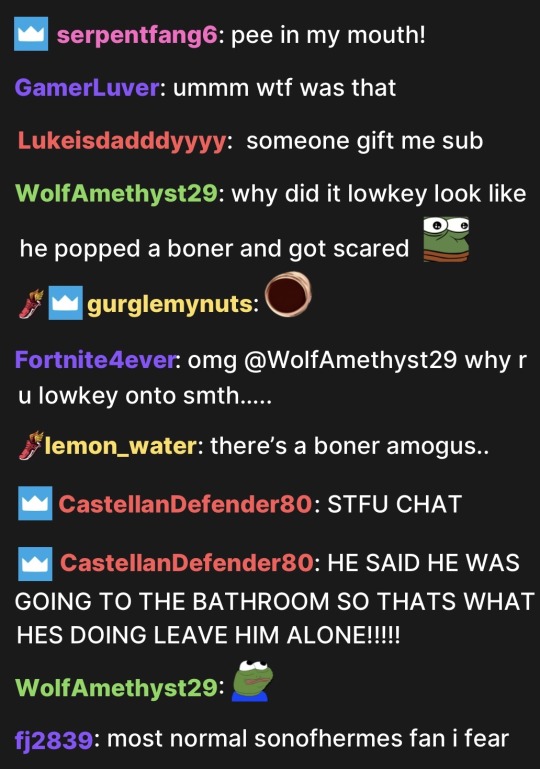
He rolled his eyes at the messages, and pushed his chair back, glaring at you on the floor. “Baby, what the hell are you doing?!”
You smiled. “I was just missing you, is all.”
“So you snuck in — wait, shit, you said one hour. It’s been an hour hasn’t it?” Luke said, running a hand through his messy curls.
You nodded, and gave a weak shrug. “It’s okay, though. I think it would be fun if we also played a game of our own.”
Luke raised his eyebrows, feeling a blush form on his cheeks. “What’re .. what’re you suggesting?”
You unbuttoned your blouse and tossed to the floor, leaving you in a lacy black bra and your mini skirt. You let your fingers linger on the strap of your bra. “I’ll let you stream longer. But.. once you cum, you have to shut it off.”
“You want to blow me on stream?” Luke asked, incredulously. He could already feel himself start to harden at the thought of this ‘game’ of yours occurring.
“Like, secretly, though.” You said with a slight eye roll. “You can try to keep your composure for as long as you can, but you’ll be all mine for the rest of the night. Okay?”
Luke took a minute to ponder. If he somehow got caught… the consequences would be severe. His reputation would be tarnished. He’d lose his job and his income and the entire career he had worked so hard to build.
But on the other hand.. you looked really fucking sexy, staring at him with your doe-eyes, feigning innocence in the most seductive lingerie he’d ever seen you in.
“Fuck’s sake.” Luke pulled his chair back towards his desk. He tugged his sweatpants down to his ankles, giving you a face full of his half hard cock and his toned, muscular thighs. “You have to be quiet too, you little slut. I seriously cannot get caught.”
“Of course,” you replied, slightly moaning as you took his length into your hand. “You’re so incredibly attractive.”
“Shut up,” Luke said, adjusting his camera angle to absolutely ensure it cut off at his upper chest and nothing lower than that was visible. He took a deep breath and was about to rejoin his stream, when you began sucking him off. “Fuck!”
You pulled your lips off of him with a loud pop. “Come on, Lukey, you can last longer than that.”
“You’re mouth feels so fucking good though,” Luke groaned, threading his fingers through your hair. He took another deep breath and guided your head back to his cock, which was now fully hard and aching for your mouth. This time, when you licked up his shaft, he was more prepared and was able to maintain his chill composure. “Okay. Okay, baby, I’m turning my stuff back on. Be quiet, please.”
You nodded, slowly taking him back into your warm mouth.
Luke turned on his camera. He turned on his mic. He ran a hand through his hair and grabbed his mouse and keyboard. “Okay, I’m back. Chat, please tell me Percy and Thalia didn’t do anything stupid while I was gone.”
“Hey!” You heard, faintly from Luke’s headset. “We didn’t do anything, and if your chat says otherwise, they are lying!”
You giggled as quietly as you could, and clearly the vibrations from such movement felt good for Luke, because you heard him take a sharp intake of breath.
“Wh-whatever. Doesn’t matter. Let’s get back to work.” Luke said defensively.
“What?” Percy asked. “You sound weird, man. Is something wrong?”
“Nothing’s wrong!” Luke replied, too quickly and at an octave higher than he normally speaks. You couldn’t help but get a little nervous. He was terrible at being subtle.
“Okay…” This was a girl’s voice, and sounded like Thalia. “My chat agrees that you’re being weird.”
“Same.” Percy agreed.
“Yeah, well,” Luke scanned his second monitor to check in on how his chat was reacting. He scoffed and rolled his eyes. “My chat is being dumb, as per usual.”

Below the desk, your nerves had subsided and instead you became preoccupied with the notion of possibly getting caught. It was kind of twisted but this caused your lower region to dampen. You lifted your short little skirt over your hips and moved your lacy underwear to the side, giving you access to finger yourself.
You moaned, with your mouth full of thick, heady cock, and brain slightly foggy from the wine consumption. You were close already.
“What?” Luke said, clearly reading something on his monitor. “Chat, that was my phone vibrating on my desk. I did not moan over that headshot Percy made. Be so for real”
“Rude,” Percy said. “I would’ve moaned. I’m like, the god of gaming.”
“Loser.” Luke responded, biting his lower lip and slightly bucking his hips into your mouth. He must’ve been getting close, too.
From that moment on, you were desperate to make Luke finish. You abandoned your slow and gentle place, and took his entire cock down your throat. You silently gagged, and bobbed your head up and down, making sure to suck a bit longer on his leaking tip. You grabbed his balls in your right hand and squeezed, keeping your left hand on his upper thigh.
“Fuck,” Luke murmured, just under his breath. You sucked harder in response. “Fuck, fuck, fuck.”
“What is going on, dude?” Percy questioned. “You’re stressing me out.”
Luke glanced over at his chat again.
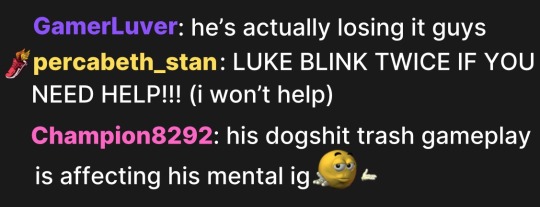
Luke flipped a middle finger to his camera, and gave a playful, “Chat, you all suck.” Obviously, he loved his fans and was eternally grateful for their support. It was just fun to mess around with them and feign a love hate relationship. It did make him a bit anxious, however, that everyone easily picked up on the fact that something was affecting Luke. It didn’t exactly help that he was really close to finishing and was starting to lose track of what was happening in the game. All he could feel was his cock going in and out and in and out of your soft lips, that were now coated in a mixture of salvia and his precum. It was just about driving him insane.
You, on the other hand, were knuckle deep inside your own cunt and sucking Luke off with so much fervour your jaw was starting to ache. But you loved the feeling. And you were determined to get him off. Now.
Suddenly, Luke felt the familiar feeling build inside himself. Before he realized it was happening, he was shooting thick ropes down your eager throat. “Fuck!” he screamed, legs shaking and eyes squeezing shut. He shuddered and gasped for air as you did not let up on your pace, sucking every last drop of cum from him.
He realized how fucking weird this whole ordeal must’ve looked to his many (many, many) viewers.
Instead of confronting what just happened, he slammed his mouse on the End Stream button and shut off his computer, without so much as a goodbye. He pushed his chair back and grabbed your shoulders, pulling you up to your feet.
You smiled at him sweetly, a sheen of sweat covering your entire body. Luke leaned down and kissed you hungrily.
“Y/n,” he said, once he was out of breath from such an intense kiss. “I.. Need. To be inside of you. And you can never, ever do that again.”
“Mhmm,” you hummed innocently. “Kinda seemed like you really liked it though.”
“Oh, shut up.” Luke said with a grin. “Bed. Now.”
You obliged, heading over to his comfy queen sized bed, unaware that you were about to have the most mind blowing sex of your entire life.

authors note: aaaaa ok. first of all i’d like to apologize. i have not proofread this at all and i wrote each chunk on separate days. i will proofread it eventually and fix the errors lmao.
also! now that all the ~lore~ to this AU is sorted, if you ever wanna send me twitchstreamer!luke specific prompts, i would ADORE THAT.
thank you all again for reading !!!!! <3
taglist: @notacluelessblonde00 @lilyirlevans
#luke castellan x reader#luke castellan x you#luke castellan#percy jackson#pjo#jemiswriting#why am i so embarassed to post this…#oh wait i know#it’s bc i cannot write smut to save my life LOL! :)
586 notes
·
View notes
Text
{ MASTERPOST } Everything You Need to Know about Saving Money and Being Frugal
We’re all in this together. Don’t give up.
On food and groceries:
How to Shop for Groceries like a Boss
Why Name Brand Products Are Beneath You: The Honor and Glory of Buying Generic
If You Don’t Eat Leftovers I Don’t Even Want to Know You
You Are above Bottled Water, You Elegant Land Mermaid
You Should Learn To Cook. Here’s Why.
On entertainment and socializing:
The Frugal Introvert’s Guide to the Weekend
7 Totally Reasonable Ways To Save Money on Cheap Entertainment
Take Pride in Being a Cheap Date
The Library Is a Magical Place and You Should Fucking Go There
Your Library Lets You Stream Audiobooks and eBooks FOR FREEEEEEE!
What’s the Effect of Social Media on Your Finances?
You Won’t Regret Your Frugal 20s
On health:
How to Pay Hospital Bills When You’re Flat Broke
Run With Me if You Want to Save: How Exercising Will Save You Money
Our Master List of 100% Free Mental Health Self-Care Tactics
Why You Probably Don’t Need That Gym Membership
How to Get DIRT CHEAP Pet Medication, Without a Prescription
On other big expenses:
Businesses Will Happily Give You HUGE Discounts if You Ask This Magic Question
Understand the Hidden Costs of Travel and Avoid Them Like the Plague
Other People’s Weddings Don’t Have to Make You Broke
You Deserve Cheap, Fake Jewelry… Just Like Coco Chanel
3 Times I Was Damn Grateful for My Emergency Fund (and Side Income)
When (and How) to Try Refinancing or Consolidating Student Loans
The Real Story of How I Paid Off My Mortgage Early in 4 Years
Season 2, Episode 2: “I’m Not Ready to Buy a House—But How Do I *Get Ready* to Get Ready?”
The Most Impactful Financial Decision I’ve Ever Made… and Why I Don’t Recommend It
On buying secondhand and trading:
Almost Everything Can Be Purchased Secondhand
I Am a Craigslist Samurai and so Can You: How to Sell Used Stuff Online
The Delicate Art of the Friend Trade
On giving gifts and charitable donations:
How Can I Tame My Family’s Crazy Gift-Giving Expectations?
In Defense of Shameless Regifting
Make Sure Your Donations Have the Biggest Impact by Ruthlessly Judging Charities
The Anti-Consumerist Gift Guide: I Have No Gift to Bring, Pa Rum Pa Pum Pum
How to Spot a Charitable Scam
Ask the Bitches: How Do I Say “No” When a Loved One Asks for Money… Again?
On resisting temptation:
How to Insulate Yourself From Advertisements
Making Decisions Under Stress: The Siren Song of Chocolate Cake
The Magically Frugal Power of Patience
6 Proven Tactics for Avoiding Emotional Impulse Spending
On minimalism and buying less:
Don’t Spend Money on Shit You Don’t Like, Fool
Everything I Know About Minimalism I Learned from the Zombie Apocalypse
Slay Your Financial Vampires
The Subscription Box Craze and the Mindlessness of Wasteful Spending
On saving money:
How To Start Small by Saving Small
Not Every Savings Account Is Created Equal
The Unexpected Benefits (and Downsides) of Money Challenges
Budgets Don’t Work for Everyone—Try the Spending Tracker System Instead
From HYSAs to CDs, Here’s How to Level Up Your Financial Savings
Season 2, Episode 10: “Which Is Smarter: Getting a Loan? or Saving up to Pay Cash?”
The Magic of Unclaimed Property: How I Made $1,900 in 10 Minutes by Being a Disorganized Mess
We will periodically update this list with newer articles. And by “periodically” I mean “when we remember that it’s something we forgot to do for four months.”
Bitches Get Riches: setting realistic expectations since 2017!
Start saving right heckin’ now!
If you want to start small with your savings, consider signing up for an Acorns account! They round up your every purchase to the nearest dollar and save and invest the change for you. We like them so much we’ve generously allowed them to sponsor us with this affiliate link:
Start investing today with Acorns
#frugal#saving money#personal finance#money tips#financial tips#financial literacy#financial freedom#money#debt#money management#how to save money
843 notes
·
View notes
Text
The aesthetic of your next lover



Warning : 18+ themes are mentioned in group 3
Group 1
Physical traits - XX Judgement, Nature Personality - Ace of swords, Power Job - Queen of pentacles, Speak truth Interests - 3 of pentacles, Patience
Your next lover definitely has a good sense of fashion! They dress to impress and are the type of person that stands out of the crowd. They look intimidating, their eyes especially could be a key feature of their looks as well as their lips, regardless of their gender. For instance they could wear graphic eyeliner or their stare is quite intense either because of the shape of their eyes or their color. Their appearance feels very natural so it is unlikely they went through aesthetical surgery or that they use a lot of products to cover up for their complexes. They have a natural beautiful smile, good skin condition, good body proportions. They feel like the more tall and slender type. They are naturally striking which is one thing people would notice about them right from the get go. They look like they come straight out of an ad. In terms of personality, this person is clever and witty. They tend to use their brain more than their heart. They are driven and ambitious, strong willed and opinionated. They're stubborn in many ways but in their case it serves them good. They know how to push through when needed. They could have a tendency to overthink. As for their career, I'm picking up on influencer and artists vibes. This person definitely has an important status and they use their voice to express their truth, whether it's in person or through social media. The queen of pentacles in this deck looks like she is super confident about her impact on people and is expected to be worshiped. So this could represent singers, musicians, models, actors. Their work could involve the body. So maybe gym instructor or nutritionist. When it comes to their hobbies, I'm picking up on : learning new things, working out, gardening, working on their spirituality / increasing their faith, any creative activity that would get them to meet people. This person likes to share knowledge and spend quality time with people.

₊˚.☾⁺₊✧✩₊˚.☾⁺₊✧✩₊˚.☾⁺₊✧✩₊˚.☾⁺₊✧✩₊˚.☾⁺₊✧✩₊˚.☾⁺₊✧✩₊˚.☾⁺₊✧✩₊˚.☾⁺₊
Group 2
Physical traits - XIX The Sun, Play Personality - 4 of cups, Strength Job - XXI The World, Trust Interests - Black Numen, The Observer
This person looks very jovial and young, bright, funny, approachable. They tend to wear casual outfits, rather baggy and practical clothes. They look confident and friendly. Their could be all types of bodies and ethnicities here but what I'm picking up on is that they look sunkissed. So they could have a lot of freckles and moles, a beautiful tanned skin. Wavy hair. If they identify as a woman, I can picture them wearing flowy dresses/skirts. They're always smiling and giggling. They give me beach boy / beach girl vibes. When it comes to their personality though, it's the complete opposite. They are rather guarded and shy, kind of pessimistic. They can be super resilient and strong willed but I feel like this person has struggled or is struggling with mental health issues. Their mind is less bright than their appearance, let's put it that way. They give me Joker vibes, minus the psycopathic tendencies. As for their job, I have several possibilities. For some, this person could be jobless at the moment because they are taking a break from work and travelling instead. I have a feeling like this person took a leap of faith and left everything behind. For others, their job involves travelling. It could be because they're a flight attendant or a tourist guide. I also pick up on people that do several jobs at a time or that are always changing jobs. Like they could work for short periods of time as a bartender and next they babysit and so on. They kinda give me student vibes. When it comes to their interests though, it's pretty clear : tarot and divination, watching horror movies and dramas, researching about the occult, watching documentaries or reports about past eras and mysterious deaths / unsolved crimes, stories about ghosts and supernatural beings, mythology.

₊˚.☾⁺₊✧✩₊˚.☾⁺₊✧✩₊˚.☾⁺₊✧✩₊˚.☾⁺₊✧✩₊˚.☾⁺₊✧✩₊˚.☾⁺₊✧✩₊˚.☾⁺₊✧✩₊˚.☾⁺₊
Group 3
Physical traits - 8 of pentacles, Trust Personality - XII Hanged man, Surrender Job - 10 of swords, Movement Interests - XV The Devil, Destruction
This person looks trustworthy and mature. They have a bulky body or at least they look strong and wise. They tend to hide their face. I'm picking up on bikers specifically. Also people that have that tech wear or gangsta aesthetic. They wear masks in public transports. They look friendly but also intimidating in some way, because of their posture or their looks. They could have tattoos. As for their personality, they're pretty chill. They like to go with the flow and enjoy life at it's fullest. They're rather open minded and curious. They are empathetic. They have no problem adopting other people's perspective and finding a common ground with others. They're more of the observer type. They're quiet but they always pay attention. This feels more like the introverted types of the MBTI profiles. When it comes to jobs, I'm picking up on physical therapists, psychologists, kinesitherapists, chiropractors, people that practice movement medicine. Also firefighters and police officers for some reason. They help people move on, especially mentally, from traumatic experiences. As for their interests, I don't get the best of vibes from this section lmao but I was picking up on getting drunk, getting high, seeking for adrenaline by adopting risky attitudes. Like racing on the highway or doing extreme sports. Watching porn, having sex. They tend to have self destructive tendencies. I was also picking up on fighting, boxing, street fights. Like MMA and stuff like that. On a more "softer" note they just enjoy wrecking havoc. So let's say they go to a party or a concert they're the type to tear the place down. I'm also picking up on festivals like Hellfest.

235 notes
·
View notes
Text
Twenty years ago, MySpace and Facebook ushered in an inspired age of social media. Today, the sticky parables of online life are inescapable: Connection is a convenience as much as it is a curse. A lot’s changed since those early years. In June, the US surgeon general, Vivek H. Murthy, called for a warning label on social platforms that have played a part in the mental health crisis among young people, of which “social media has emerged as an important contributor.” Social Studies, the new FX docuseries from documentarian Lauren Greenfield, bring the unsettling effects of that crisis into startling view.
The thesis was simple. Greenfield set out to catalog the first generation for which social media was an omnipresent, preordained reality. From August 2021 to the summer of 2022, she embedded with a group of teens at several Los Angeles–area high schools for the entire school year (the majority of the students attend Palisades Charter), as they obsessed over crushes, applied to college, attended prom, and pursued their passions.
“It was an unusual documentary for me,” Greenfield, a veteran filmmaker of cultural surveys like The Queen of Versailles and Generation Wealth, says of how the series came together. “The kids were co-investigators on this journey.” Along with the 1,200 hours of principal photography Greenfield and her team captured, students were also asked to save screen recordings of their daily phone usage, which amounted to another 2,000 hours of footage. Stitched together, the documentary illuminates the tangled and unrelenting experiences of teens as they deal with body dysmorphia, bullying, social acceptance, and suicidal ideation. “That’s the part that is the most groundbreaking of this project, because we haven’t really seen that before.”
The depth of the five-episode series benefits from Greenfield’s encyclopedic approach. The result is perhaps the most accurate and comprehensive portrait of Gen Z’s relationship to social media. With the release of the final episode this week (you can stream it on Hulu), I spoke with Greenfield over Zoom about the sometimes cruel, seemingly infinite experience of being a teenager online today.
JASON PARHAM: In one episode, a student says, “I think you can’t log in to TikTok and be safe.” Having spent the previous three years fully immersed in this world, I’m curious if you think social media is bad?
LAUREN GREENFIELD: I don't think it's a binary question. I really went into this as a social experiment. This is the first generation that has never grown up without it. So even though social media has been around for a while, they are the first generation of digital natives. I thought it was the right time to look at how it was impacting childhood. It’s the biggest cultural influence of this generation’s growing up, bigger than parents, peers, or school, especially coming out of Covid, which was when we started filming. You know, I didn't go into filming with a point of view or an activist agenda, but I certainly was moved by what the teenagers said to me and what they showed in their lives, which is that it's a pretty dire situation.
Without a doubt.
Jonathan, in episode five, says it's a lifeline, but it's also a loaded gun. So I don't think it's about whether there are good things in it and bad things. We see both in the show, but we also would not let our kids be around a loaded gun. So I do think that we need to change the engineering of it so that we can keep the good and not have the bad.
I entered high school in 2000, before the social media boom, and I always joke with friends how I probably would not have survived if we had it the way kids do now.
The genie is out of the bottle. But there is regulation now to get rid of it in schools, which I think is great. We also see the problem of distraction in the show. And we see the need of this generation for person-to-person connection, which they don't have enough of. We've also seen how for people like Nina, LGBTQ+, even some of the social justice reactions that happen in the series, it has a use. It also is a means of creativity and entrepreneurship. And we see that with our characters too.
But there are also just things that make life extremely toxic for teenagers—the 24/7 comparison culture, the algorithm bringing them down harmful paths of learning. What some of the new information coming out of TikTok’s internal research shows us is that these apps are engineered and they can be engineered differently.
Have you seen the Jim Henson movie? It’s called Idea Man.
No, I haven’t.
One thing that really moved me that I thought was relevant to social media and thinking about the good and bad of it, is that Joan Ganz Cooney—the TV producer who started Sesame Street—had this idea of bringing in people who know what kids love, which was Jim Henson and the creatures, with people who know what kids need to learn and what they need. It’s that second piece that has never been relevant to tech designers and engineers who have only been designing for maximum engagement, even if it's at the expense of the health and well-being of young people. We have a mental health crisis on our hands because of it. Technology is important and important for so many reasons, but I think we have an untenable situation with the current engineering of social media.
So you’re saying we need even more guardrails?
Now having filmed the show—and I hope people get it—we have to have empathy for these teenagers. Like, it's not fair to ask them to self-regulate when the apps have been designed to be addictive.
How did you land on Los Angeles as the petri dish for this social experiment?
I've been looking at youth culture for 30 years. My first book, Fast Forward: Growing Up in the Shadow of Hollywood explored how kids were influenced by the values of fame, image, and materialism. Those themes are also really relevant in the social media age. Fame is something that is not for celebrities anymore, it's for every kid looking for likes. And likes have become a rite of passage, in terms of popularity. Image making, FaceTune, Photoshop, styling, curating your brand—all of these things that used to be the realm of celebrities are now the realm of everyday children. And a lot of times in my work, I'm trying to document the air we breathe, the popular culture that's all around us. Sometimes it's hard to see. So for me, with LA, I wanted to look at where that was the most pure and strong, rather than where it was average.
The point of view shifts between students and parents. Ivy’s mom in particular has very sharp views about trans people, vaccines, and politics. Why also include their voices in a series so acutely focused on teen life?
When I started, I didn't know I was going to include the adults, but they ended up being so important. There are a lot of loving, caring parents in the show who have no idea what's going on in the social media lives of their kids. I didn't know a lot as a parent either. I think that the show is very entertaining for teenagers, twentysomethings, and thirtysomethings. For parents, it's more of an education and I hear more of them being shocked by it. It was important to see the disconnect between this generation and their parents, how much things have changed, and how much parents don't realize what's going on.
Many of the kids started taking action into their own hands.
One of the most important things I came out of this with is, parents, teachers, and administrators are not addressing the problems. They might not even understand the problems. So we get this world of young people helping each other. We have Jonathan, Cooper, and Dominic all working at a crisis hotline doing peer counseling for kids in distress. We have Anthony who becomes a vigilante because he's so frustrated that nobody's doing anything about the racist incidents and sexual assault that he’s seeing. And we have kids also making media, like Cooper having a podcast about body image. That stuff is sprouting up because they're very alone in this.
Why do you think there is such a disconnect?
They’re just from a different generation. My youngest, who is 20, I remember I would ask to see stuff. And this was in the earlier stages of social media. You know, I kind of demanded that he would show me. But he refused. He had a different view of everything. He felt it was his private space. We need to move off that and open up a dialog. This show, it's really meant more to open dialog rather than have solutions, even though the kids give us some solutions. But the parents are an important part of the equation.
Like Ivy’s family?
Ivy's family story was a really important social media story. It's kind of the story of the division that we're seeing in our culture now—how algorithms and silos take us into these different ways of thinking and split us apart, how they make the other the enemy. We’re seeing how terrible the disinformation problem is, how tragically it could affect all of us in this election. Their story came about very unexpectedly. But I thought it was fascinating, and getting to know all the members of that family, you can see how both parents love their kids, how both kids love their parents. I didn't want to vilify anybody. But we also see how tragic it is when ideas and algorithmic silos divide family members.
Watching the series made me wonder if these kids are doomed, in a sense, because they are so beholden to platforms like TikTok and Snap. It’s all they know. Is this a tragic story?
No, I don't think so. The hope we see in episode five and their resilience is a testament to the resilience of this generation and the way they can help us carve a path forward. If anything, the adults have been a little bit irresponsible and kind of unknowing. The tech companies have been downright irresponsible. Safeguards like we have in all other media have been missing. Not to point fingers, this is a medium that has come up very quickly—
Please point fingers.
Look, it's relatively new what we're learning. In episode five, Sydney says, “Once we knew the harm of cigarettes with lung cancer, there was change made, there was regulation. And now we know there's a connection between social media, mental health, eating disorders, and suicidal ideation.” So once this knowledge is here, we have to act. To me it's very hopeful, and I know at the end the kids are like, “What do we do? We can't live without it.” But understanding that there are actually a lot of things that can be done, between regulation, between asking tech companies to change the algorithm, and also legally if they were responsible for their publishing, like every other publisher, we might be in a different space.
143 notes
·
View notes
Text
Alexandre Bissonnette edit + infopost
~~~~~~~~~~~~~~~
The edit is for you to see some photos of him!
I want to say I don't support any actions !!
My content is because I love true crime and political cases ~~
if I like the person is for him/her personality, appearance or manner. But I do not support hate crimes or murders
Event summary
Alexandre Bissonnette, 27, entered a mosque armed with a pistol and killed 6 men, injuring 19 more, one of the victims was left paraplegic for the rest of his life
Family, social life, curiosities
Bissonnette has a twin brother with whom he shared an apartment four miles from his parents' house. But Alexandre Bissonnette often slept at his parents' house on weekends.
He was Canadian, born and raised in Quebec City. He was always described as a simple and ordinary man. Bissonnette had already taken antidepressants, but it was stated that his mental state had absolutely no influence on the crime, as he was considerably stable and fully conscious.
He had a Facebook page and also a Tumblr page, where he posted about his daily life, food, etc. However, on Facebook, he made a lot of political comments. Emails from Alexandre and his father were also found that spoke negatively about Muslims. Many people believe that Alexandre received this prejudiced upbringing from home. He and his father used to practice shooting at an outdoor range and Alexandre would often hang out with old friends. However, he did not have a girlfriend, and was described as a shy and somewhat introverted man.
The father, and also Alexandre himself on social media, stated about the problems the boy had with alcohol. However, according to a blog by Bissonnette, he had stopped drinking because, according to him, it "is very bad for your health!" and he reported, with these words, that he was "very happy about it!" However, even with this abstinence from alcohol, the shooter told the authorities that he drank sake the entire day of the massacre.

Security camera footage from a depanneur shows Alexandre Bissonnette buying a drink minutes before the Quebec City mosque attack on January 29, 2017
"Throughout his life, until January 29, Alexander had never demonstrated violent behavior in words or actions toward anyone. "Alexander is the last person we, and all those who know him, could imagine doing something so out of character," Alexander's father said.
Bissonnette was a political science student at Université Laval in Quebec City. He also works and had a steady job, but was on three weeks' leave when the shooting happened. Alexandre had a history of bullying, probably because he was quiet and reserved, but this did not seem to have a direct impact on the case. In any case, he was described as an "ordinary" man.
about the bullying he suffered his father said: "Realizing that nothing was getting better, Alexandre simply stopped mentioning it to us. I can't tell you how much I regret not doing more to make sure Alexandre was safe at school."
In 2014, Bissonnette was introduced to firearms by a friend. He went on to apply for a license, falsely reporting that he had no history of mental health issues or suicidal thoughts. Over the next few years, he would legally acquire six guns.
Bissonnette told psychologists during interviews that he had always had thoughts about mass shootings. Interestingly, Alexandre was fascinated by the Columbine Massacre.
Alexandre had also thought about carrying out a massacre in a shopping mall, carrying weapons in his bag and everything, but he gave up.
ideologies and thoughts about Islamists
Alexandre was an actively political person in his speeches and discourses. He seemed to be very interested in the subject, and it was no wonder that he was studying Political Science. However, Bissonnette's political positions always leaned towards a more extreme side, related to violence. He was a nationalist, but a nationalist who preached the unity of white people only. He also supported Marine Le Pen's party in France and Donald Trump in the United States. He frequently posted on his Facebook page against immigrants, against pro-immigrant policies, against Muslims and against feminists.
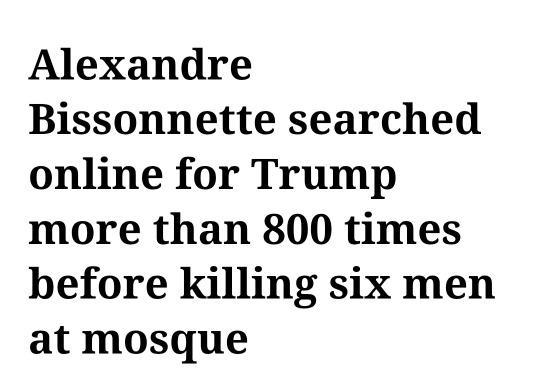
Historical context of the city and the mosque
Before talking about the massacre, it is essential to talk a little about the state of mind of the city and the mosque that suffered the attack.
Quebec City has always had questionable positions on ethnicity, immigration and Islam. The mosque has previously suffered an Islamophobic attack, in which a pig's head was placed on the mosque and a note reading "Bon appétit" in French (the local language).
The Quebec City mosque mass shooting on January 29, 2017
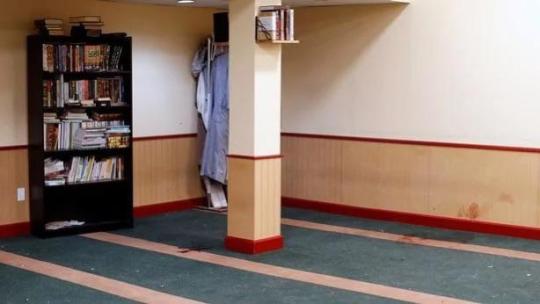
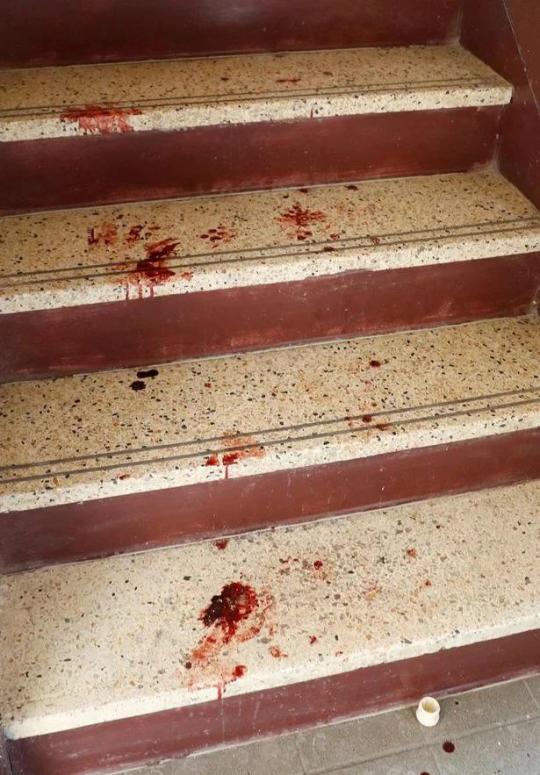


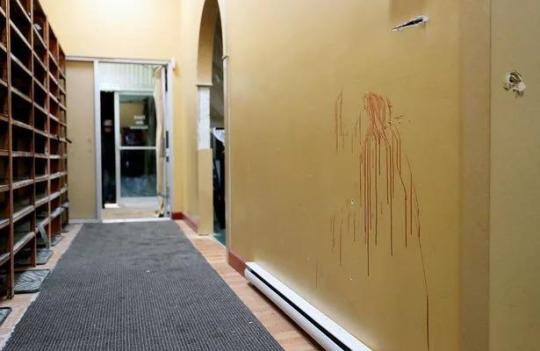

In the month leading up to the shooting, Bissonnette was on leave from his job at Héma-Québec with an anxiety disorder following an altercation with a co-worker. During this month, he obsessively visited the Twitter accounts of several right-wing media personalities, including Tucker Carlson, Laura Ingraham, David Duke, Alex Jones, Mike Cernovich, Richard B. Spencer, and Kellyanne Conway. Bissonnette checked Ben Shapiro's Twitter account 93 times in the month leading up to the shooting. He was also on leave from his university political science program. He was scheduled to return to work the day after the shooting. During his free time, he regularly visited Islamophobic websites and searched the web for information about mass shooters.
When Alexandre Bissonnette heard about Justin Trudeau’s famous tweet welcoming refugees to Canada, the frail-looking 28-year-old political science student told police he went crazy. A few hours after watching a television report suggesting that Canada would accept immigrants rejected by President Trump
On the day of the shooting, Alexandre spent the day drinking and finishing his research on mass murders, immigration and Islamic terrorism, including checking news reports on crimes committed by Muslims in the country. That night, he went to his parents’ house for dinner and then sat in a corner, fiddling with his computer. At 7 p.m., he left the house armed with a 9 mm pistol and a Czech semi-automatic rifle of .223 caliber. He left home in his parents' car, saying he was going to practice shooting. At 7:37 p.m., he hesitated to continue shooting, so he went into a store and drank some vodka. Then, afraid of being seen carrying a large weapon, he decided to return to the mosque to carry out the attack.
He arrived at the mosque around 7:53 or 7:54 p.m. Outside, there were two brothers, at whom he pointed the rifle, which failed, jamming. Alexander appeared relaxed, smiling, throwing the rifle on the ground and pulling out his pistol. He fired several shots at both of them, in the arms and abdomen, then got close and shot the brothers in the head, with the pistol pressed against them.
Two more mosque worshippers announced that there was a shooter, and chaos soon broke out. Alexandre entered the room, firing ten shots, then reloaded. Bissonnette re-entered the prayer hall. He would fire 30 shots in 30 seconds during the second wave, and would target mainly people trying to take cover.
Aymen Derbali, crouched near the gunman, attempted to distract him from the busier areas of the mosque by staggering toward him, but was shot in the knee and chin.[31] As Derbali fell and crawled on the ground, Bissonette shot him 6 more times, but Derbali would survive.[32] Bissonnette then targeted 44-year-old Aboubaker Thabti, murdering him at close range with three shots to the skull.
The gunman returned a second time to the lobby to reload his weapon, then returned to the prayer hall and killed some of the worshippers who were already wounded and others who were wounded. He then pocketed a bullet, intending to take his own life in a nearby forest, and then left the mosque at 7:57 p.m.
According to an initial report, a man who came forward as a witness said that two assailants dressed in black and with a Quebecois accent entered the mosque and shouted "Allahu Akbar" before opening fire. Police later determined that there was only one shooter, and that was Alexandre.
Later, at 8:10 p.m., Alexandre Bissonnette called emergency services (911) and turned himself in.
Alexandre Bissonnette was sentenced to life in prison for the 2017 Quebec mosque attack. He was originally scheduled to serve 40 years before being eligible for parole. However, in 2020, the Quebec Court of Appeal reduced that sentence to 25 years, ruling that 40 years without the possibility of parole constituted cruel and unusual punishment. In 2022, the Supreme Court of Canada upheld that decision, maintaining his eligibility for parole after 25 years. Therefore, Bissonnette will be eligible for parole in 2042.
Victims
The six murder victims were Ibrahima Barry (39, an IT employee for the Quebec government), Mamadou Tanou Barry (42, an accounting technician), Khaled Belkacemi (60, a professor at Laval University), Aboubaker Thabti (44, a pharmacy technician), Abdelkrim Hassane (41, a computer analyst for the Quebec government) and Azzedine Soufiane (57, a grocery store owner).
#tccblr#tcc tumblr#teeceecee#tcc fandom#tc community#tcctwt#alexandre bissonnette#tcc info#info post#mass killers
36 notes
·
View notes
Text
University administrators appear unconcerned that COVID is increasingly rampant on Ontario campuses - Published Oct 15, 2024
By Steve Wilcox
'We are witnessing a failure in public health as vulnerable people are being left to self-organize around a larger systemic problem'
From the University of Toronto to Wilfrid Laurier University to Carleton University, students across Ontario are begging one another to take precautions against COVID-19.
Statements like those below, posted by students to Reddit, a social media site that hosts unofficial forums for universities across Canada, appear on a daily basis now.
“I swear every lecture I go to at least 7 people are one cough away from respiratory failure.” – r/UTSC
“Guys, can you please stay home if you have the god awful cough?…I really don’t want to get sick and some of you aren’t masking or even bothering to cover…” – r/WLU
“Please wear a mask if you’re sick. It seems like a basic courtesy that if you’re coughing and sneezing you should be wearing a mask. We are students and missing class obviously impacts our learning and how much work we can do” – r/CarletonU
On forums like r/UofT you’ll find students using the internet’s equivalent of shouting to implore people to protect themselves and others:
“WEAR A MASK IF YOU’RE SICK OR HAVE BEEN SICK RECENTLY FFS. DO YOU KNOW HOW MANY TIMES I’VE HEARD SOMEONE SAY ‘yeah I’m sick’ OR HEARD SOMEONE COUGHING AT 100000 DECIBELS WITH AUDIBLE PHLEGM AND THEN THEY’RE NOT WEARING A MASK…” – r/UofT
At Laurier, where I research the relationship between play and cognition, there has been no mention of the virus this term; no communication about the risks; no guidance on how students, staff, and faculty can protect themselves.
Let’s be clear: what we are witnessing here is a failure in public health as vulnerable people are being left to self-organize around a larger systemic problem over which they have diminished control and a reasonable expectation that if they were at risk (they are), the school they are attending would inform them (they are not).
At Laurier, where I research the relationship between play and cognition, there has been no mention of the virus this term; no communication about the risks; no guidance on how students, staff, and faculty can protect themselves. At the same time, it is not uncommon for a quarter of the class to be absent at any given time in our program. This has to change.
When I say that vulnerable people are being left to fend for themselves, I mean all of us. We are all vulnerable to COVID, from our lungs to our hearts to our brains. Since higher education is about developing thinking and reasoning skills, I’ll focus on just the mental or cognitive impacts of a COVID infection. As a disclaimer, a number of these studies rely on measuring changes in IQ, a problematic tool for assessing intelligence, partly due to cultural and social biases. However, these studies do provide insight into baseline changes in cognitive functioning.
COVID research tell us that:
Mild COVID infections are associated with a drop in IQ, warns the New England Journal of Medicine. In adolescents and young adults, mild COVID infections disrupt brain connectivity and reduce memory function, according to research from Translational Psychiatry. A single, mild COVID infection can result in the equivalent of the brain aging 10 years, leading to “larger cognitive decline” compared to those uninfected, Nature reports. Young, healthy adults who experience a mild COVID infection show memory and cognition impairment, according to a study published by Heliyon. More severe infections lead to higher drops in IQ, (New England Journal of Medicine); and in one study, one in nine people hospitalized with COVID saw a 30pt drop in IQ (Lancet). Long COVID is associated with severe cognitive slowing (Lancet) One in six Canadians infected with COVID report long COVID symptoms (Government of Canada) These impacts on cognition can last for years (Lancet) If you or your child is attending an Ontario university and they are not taking the proper precautions, they are at risk of graduating with worse cognitive performance than when they arrived. This is not to dimmish students, a number of whom recognize the need for precautions and are scrambling to protect themselves and others. Rather, the responsibility lies with university leadership who have the resources and responsibility to distribute that information at scale. And yet they remain reluctant to even acknowledge the existence of COVID, let alone promote precautions.
Importantly, we do have a “near perfect” solution to this problem: respirators (i.e. N95 masks) are 98 per cent effective at stopping the spread of the virus. As we saw last week on TVO’s The Agenda, informed, equity-focused experts recognize the role of wearing and promoting masks designed to stop airborne pathogens during an ongoing pandemic. It’s worth questioning why this guidance isn’t also being promoted by our governments, local public health officials, or on our university campuses where faculty are producing peer-reviewed research on the harm COVID causes, research that is then resoundingly ignored by their own institutions.
This all seems tied into a broader trend away from evidence-based decision making — the bedrock of good governance — towards decision-based evidence making.
Though by no means a new phenomenon, increasingly leaders are deciding what a policy will be and then manufacturing the evidence that supports that position. It’s an inversion of the scientific method and a dangerous shift towards a post-truth politics in which peer-reviewed research holds as much sway over decision-makers as any other opinion, perhaps even less so given the deference we are witnessing from leadership towards reactionary right-wing framing of topics like the climate crisis, vaccines, genocide, and other socially pressing but economically and politically inconvenient issues.
This all seems tied into a broader trend away from evidence-based decision making — the bedrock of good governance — towards decision-based evidence making.
Indeed, political expedience — making decisions based on what is most convenient rather than what is most moral — is becoming the new norm. The fact is, COVID is an inconvenient truth and leaders have taken the path of least resistance in responding to it, choosing the more expedient route of appeasing those who reject science and our duty to care for others rather than embracing evidence and minimizing harm. While we have become somewhat inured to this from elected officials, there’s something particularly pernicious about an institution of higher education dismissing science, particularly when this involves exposing learners to a virus that diminishes their ability to think, to reason, to learn, and in some cases to even function.
If labelling this post-truth politics seems like an overreach, consider that while universities ignore a demonstrably harmful virus, they continue to position themselves as bastions of equity and inclusivity and to promote the very research they ignore in their own governance.
What needs to happen now? University administrators need to publicly acknowledge the spread of COVID on our campuses; they need to clearly and repeatedly convey the risks in ways that align with best practices for communicating public health information — a single email buried amongst countless others is not going to be effective.
Most importantly, they need to explain how students can protect themselves and each other, such as cleaning the air via enhanced ventilation. The science on the harms of COVID and how to prevent it is becoming quite clear; it’s time for our university leaders to do what we teach our students to do: follow the evidence. The hearts and minds of our students depend on it.
Dr. Steve Wilcox is an associate professor in the game design and development program at Wilfrid Laurier University where he researches the relationship between cognition, play, and communication.
#mask up#covid#public health#pandemic#wear a mask#covid 19#wear a respirator#still coviding#coronavirus#sars cov 2
21 notes
·
View notes
Text
Let's talk about this article:
... because I read the study, and I have some questions.
This article breathlessly states that trans and gender non-conforming teenagers are attempting suicide by up to 72% more, potentially based on laws their states are passing.
... but also as low as 7% more. So no, there is no massive wave of individuals committing or attempting suicide everywhere. There is no trans "genocide."
The survey run by the study did have participants ages 13-24, and found those participants through social media ads. They had more than 5,000 respondents from California and less than 180 from Wyoming, just as an idea of the sample.
The study admits that "no work has been able to identify casual mechanisms between state-level anti-transgender laws and the mental health of the TGNB (transgender/non-binary) community" and "no research has specifically identified a casual link between anti-transgender laws and increased suicide risk" but then boy does it go on and try.
It also fully admits that TGNB teenagers "are already at risk for mental health concerns," which the study believes is due to "minority stress" (stress associated with being the negative impacts of being part of a minority) or potentially because they feel "unimportant and disconnected" (who doesn't, as a teenager?) but which, in my opinion, is more likely because everyone keeps telling them they're going to commit suicide.
Let's talk about these laws that are apparently causing "trans children" not to exist. There have been laws to limit access to cross-sex hormones, dangerous off-label cancer drugs, and permanent life-changing surgery on minors (considering these drugs have a wide range of side effects like slowed intellectual and emotional development, osteoporosis, vaginal atrophy, permanent infertility, and never being able to orgasm, and the surgeries are designed to remove healthy body parts, this seems positive); keeping bathrooms segregated by sex (considering that girls face higher levels of abuse in mixed-sex restrooms and changing rooms, this also seems positive); and keeping sports sex-segregated as well (considering that male and female athletes have different strengths and body types, this seems like it would increase fairness for both groups, and so seems positive to me too).
Now let's talk about people who are actually committing suicide, not just using it for emotional abuse:
The Jed Foundation, which works to increase mental health support on high school and college campuses, says that almost 14% of young adults and 22% of high school students have seriously considered suicide in the past year; 10% of high school students attempted suicide in the past year. The groups with the highest rates of both consideration and attempts are females, Native Americans, and lesbian, gay, and bisexual individuals.
The CDC tells us that teenagers in rural communities who face isolation, Black teenagers, and "LGBT" teenagers have the highest rates of suicide deaths. Alaska (which has, notably, no anti-trans laws on the books) has the highest rate of suicide deaths (roughly 40 in 100,000), and it's noted that pockets of suicide spring up in groups like Native Americans, Mormons, and evangelical Christians. The places with the lowest suicide rate for teens are urban areas and big cities, whereas those in isolated areas with higher access to firearms and illegal drugs or alcohol see higher rates.
The rate of teen suicides is the lower than the general suicide rate of the entire US. Elderly people have the highest rate of suicide. But yet all that's talked about is the rate of specifically trans kids killing themselves because they couldn't get "gender-affirming" health care, or play on a sports team, or go into the opposite sex's bathroom. The media has decided to push this angle, and almost everyone has eaten it up. Obviously they're the most affected by everything.
I am tired of this narrative. Teenagers and kids deserve better.
15 notes
·
View notes
Text

That Librarian by Amanda Jones
A small-town US librarian’s lively account of her battle with a group of far-right censors reveals the toll it took on her health
Amanda Jones’s story is awful – and important. A school librarian for 23 years in her home town of Watson, southern Louisiana, she has watched with concern in recent years as a movement of book-banning swept across the US. According to the American Library Association, “book challenges” in public libraries almost doubled from 729 in 2021 to 1,269 in 2022.
In July 2022, when Jones heard about a public meeting that would discuss “book content” in local libraries, she went along. A board member said she was “concerned” about some “inappropriate” material in the local library’s children and young adult sections. In response, Jones gave a measured speech, explaining her belief that “while book challenges are often done with the best intentions, and in the name of age appropriateness, they often target marginalised communities” and “books on sexual health and reproduction”. She went on to detail the “First Amendment right to borrow, read, view, and listen to library resources”.
“I said nothing earth-shattering,” Jones writes in her memoir. But within days her life had been upended because of two posts on social media. The first was by the Facebook page of Citizens for a New Louisiana, a far-right group whom Jones knew had worked to defund a library in nearby Lafayette and whose executive director was a man named Michael Lunsford. It accused Jones of “fighting so hard to keep sexually erotic and pornographic materials in the kids’ section”. The second Facebook post was made by local man Ryan Thames, who wrote that Jones advocated “teaching anal sex to 11-year-olds”.
The posts were shared widely by local people, including many Jones knew. “One parent in particular whose child I had helped with getting services for a learning disability was especially vicious,” she writes, devastatingly. Later, she received a death threat. Over the course of the next year, Jones, who is in her mid-40s, lost a lot of weight, experienced hair loss and took medical leave from work. In the spring of 2023 she sued Lunsford and Thames for defamation.
That Librarian is Jones’s account of the 2022 public meeting that started her ordeal, the ultimately unsuccessful court case and all that followed. She has a lively, convivial style: “I worried that my friends and family would be targeted next. Spoiler alert: they were.” Sometimes this breeziness veers into pettiness, as when she describes an opponent who has “the spelling and grammar of a child of 10”, or refers to Valarie Hodges, a member of the Louisiana state senate who posted online against Jones, as “my gal pal Val”.
The more wistful sections are warming. Jones describes how she was in high school when Watson had its first traffic light installed – that’s how small a town it is. She credits her teenage reading of Judy Blume, one of the most banned authors ever, with “making me more empathetic”. Jones believes uncompromisingly in the power of books to open minds. And through working as a school librarian, has seen the impact of exclusion politics: “I have lost more former students to suicide than I care to think about, many of whom, I suspect, died as a direct result of being made to feel excluded in our society.” Together, these experiences have informed her anti-censorship mentality.
But she knows party politics comes into it too. Her local area has become “extremely alt-right and conspiratorial” in recent years, and she has noticed that “all book banners seem to be Republican”. She is refreshingly honest about her relative complicity. “It wasn’t until I was into my 40s that I realised some aspects of our country weren’t that great,” she writes, before admitting that she voted for Donald Trump in 2016. She regrets it now, but these admittances are important. Listening to voices from across the political divide, and understanding the ways in which we are both similar and different to those who vote similarly and differently to us is crucial in understanding why the world is the way it is – even more so after Trump’s re-election.
Several times, Jones refers to how she has tracked her defamers to see they have also donated to election campaigns of particular pro-ban politicians. But she never fully examines the intricacies of this likely organised overlap, or takes a step back to consider how this current wave of book banning compares with historical cases. As such, “my fight against book banning in America” would be a more suitable subtitle, not “the fight”. This is a brave, fascinating book, but it’s the personal story of Jones’s ordeal – about which she is evidently still very bitter – rather than an account of the movement as a whole.
Daily inspiration. Discover more photos at Just for Books…?
9 notes
·
View notes
Text
Self-care habits
Self-care is essential for high school students to maintain their mental and emotional well-being amidst academic pressures, social challenges, and personal growth. Here are several self-care habits, practices, and techniques specifically tailored for high school students:
Establish a Routine: Create a daily schedule that includes time for studying, hobbies, relaxation, exercise, and sufficient sleep. A consistent routine helps in managing stress and maintaining a sense of control.
Prioritize Sleep: Ensure you get adequate sleep each night (around 8-9 hours) as it directly impacts mood, concentration, and overall well-being. Maintain a regular sleep schedule, even on weekends.
Mindfulness and Meditation: Practice mindfulness techniques or meditation to calm your mind and reduce stress. Apps like Headspace or Calm offer guided meditation sessions suitable for beginners.
Physical Exercise: Engage in regular physical activity or sports that you enjoy. Exercise not only improves physical health but also releases endorphins, boosting mood and reducing stress.
Healthy Nutrition: Eat a balanced diet rich in fruits, vegetables, whole grains, and lean proteins. Avoid excessive caffeine and sugary foods, as they can negatively impact energy levels and mood.
Limit Screen Time: Reduce the time spent on electronic devices and social media platforms. Constant exposure to screens can contribute to stress and anxiety. Take breaks and engage in offline activities.
Creative Outlets: Explore creative activities such as painting, writing, music, or crafts. These outlets offer a means of self-expression and can serve as stress-relieving hobbies.
Journaling: Maintain a journal to express thoughts, feelings, and experiences. Writing can be a therapeutic way to process emotions and gain clarity on various situations.
Set Boundaries: Learn to say no when you feel overwhelmed by commitments. Establish boundaries in relationships and commitments to prevent burnout.
Social Connections: Nurture positive relationships with friends and family. Spend time with people who support and uplift you. Surround yourself with a supportive community.
Relaxation Techniques: Practice deep breathing exercises, progressive muscle relaxation, or visualization techniques to reduce stress and promote relaxation.
Take Breaks: Break up study sessions with short breaks to prevent mental fatigue. Incorporate activities that refresh your mind, such as going for a walk or listening to music.
Seek Help When Needed: Don’t hesitate to seek help from a counselor, teacher, or trusted adult if you're feeling overwhelmed or experiencing persistent feelings of anxiety or sadness.
Self-Compassion: Be kind to yourself. Embrace mistakes as opportunities to learn and grow rather than being overly critical. Practice self-compassion and positive self-talk.
Engage in Nature: Spend time outdoors, whether it's a walk in the park, hiking, or simply enjoying natural surroundings. Nature has a calming effect and can reduce stress levels.
Remember, self-care is an ongoing practice. Experiment with different techniques to discover what works best for you. Consistently incorporating these habits into your routine can significantly contribute to maintaining a healthy and balanced life during your high school years.
-hygieia's saint
#self care#positive mental attitude#mental health#self improvement#self love#high school#you can do it#mental health matters#healthpsychology#blog#mental heath awareness#mental heath support#mental health blog
13 notes
·
View notes
Text
Photography
Twitter Draft

0 notes
Text
The Parent Trap by u/Mickleborough
The Parent Trap Being curious as to exactly what was Meghan and Harry’s anti-cyber bullying initiative, I went to where angels fear to tread: the Archewell Foundation website.I won’t contaminate this post with screen shots - you’ll have to take my word. What does the Parents’ Network do?What’s the target group? The name and text refers to parents (although a couple of paragraphs inconsistently - and belatedly - mention caregivers as well). The overall impression is that this overlooks other child-adult relationships, namely children looked after by relatives or guardians.Briefly the aim seems to be this:’We [the Parents’ Network] act as a support network for other parents and caregivers whose children and families have been gravely impacted by social media harms.’In case this isn’t clear:’The Archewell Foundation and the network will work to unite and uplift parents and caregivers and systematically change the social media platforms that create a harmful and dangerous environment for young people around the world.’No, really, what does the Parents’ Network do?It appears to want to be an influence or pressure group. To what end? My guess is: censoring social media.Governments have implemented, or are the process of implementing, legislation dealing with online safety. So there’s no point campaigning for that.The website states: ‘It is time that social media companies improve their safety measures and that people in power hold them to account. Join us in adding your voice so we can no longer be ignored.’Some observations on content* The text is inconsistent: see example above. It also contains these statements which don’t make sense: ‘…these platforms should be a destination where young people can communicate, thrive and learn. Instead online spaces are designed to keep our children scrolling and waiting for the next notification, like or comment.’That’s comparing apples and oranges. Learning and socialising online are different things. And it promotes communication, but condemns forms of communication, viz ‘scrolling and waiting for the next notification, like or comment.’* In my opinion, the writing isn’t great. It’s not impactful; it reads like something written by a moderately talented high school student in the late 1980s. Using short sentences, complete with repeated words for emphasis, for impact and drama (’We share our stories. We share our resources. We take action. Together’) is dated. The practice now is to get the message across with succinct sentences, because people aren’t stupid.* Confusingly there’s a sentence that states: ‘In 2023 we were brought together by The Archewell Foundation.’Firstly - Who’s ‘we’? The landing page has the logos of The Archewell Foundation and of Parents’ Network - but didn’t the former begat the latter?Secondly - Sycophantic write-ups elsewhere mention that the Parents’ Network had a 2-year pilot / testing gestation. If so, what’s with 2023? Can someone not count? Or did the Parents’ Network start off like the birth of an illegitimate child in 2021, before being acknowledged by its parent in 2023?Fun ‘fact’: ‘Since inception, The Foundation has been working to find solutions to the rapidly escalating crisis in youth mental health.’ They’ve certainly kept this work quiet.On an irrelevant note - there are loads of Parents’ Networks: the [British] Army Parents’ Network, the Solihull Parents’ Network, [the Council of Europe] Parents’ Network - that must be why Meghan hasn’t trademarked the name.Link to a website of a proper foundation: The Royal Foundation for Early Childhood post link: https://ift.tt/J3fxSH4 author: Mickleborough submitted: August 05, 2024 at 10:13PM via SaintMeghanMarkle on Reddit disclaimer: all views + opinions expressed by the author of this post, as well as any comments and reblogs, are solely the author's own; they do not necessarily reflect the views of the administrator of this Tumblr blog. For entertainment only.
#SaintMeghanMarkle#harry and meghan#meghan markle#prince harry#fucking grifters#grifters gonna grift#Worldwide Privacy Tour#Instagram loving bitch wife#duchess of delinquency#walmart wallis#markled#archewell#archewell foundation#megxit#duke and duchess of sussex#duke of sussex#duchess of sussex#doria ragland#rent a royal#sentebale#clevr blends#lemonada media#archetypes with meghan#invictus#invictus games#Sussex#WAAAGH#american riviera orchard#Mickleborough
7 notes
·
View notes
Note
Can you share your experiences with being in special ed? What are some pros and cons of switching to a special ed school from mainstream education?
Yes, I'd be happy to share some of my experiences and perspectives. ^^
Until the age of 11, I was in general education. Being in general education without adequate support was a challenge. I often felt isolated, scared and misunderstood. I struggled to keep up with the pace of the classroom and found it difficult to form relationships. When I finally did make a friend, I became so incredibly attached to and obsessed with them to the point it was "suffocating" for both of us, and majorly impacted my mental health in a negative way. I already struggled in class, and couldn't keep up, so it definitely didn't help that all I could think about was this friend (who was already toxic in the first place). I also had teachers who weren't understanding at all. My fourth grade teacher literally made me throw away my project once because I folded it wrong, and then wouldn't let me start over.
Point is, general education was really difficult for me, and it felt really unsafe.
It wasn't until I entered special education that I began to receive the support I needed to communicate and learn effectively. One of the biggest advantages of attending a special education school as an autistic individual is the access to specialized support and resources. In my experience, special education schools often have a team of professionals who are well-versed in working with autistics. They understand the unique challenges and strengths of autism and can tailor their support to meet my specific needs.
I am allowed to take breaks, there are multiple ESA's on campus, bringing comfort objects is normalized, stimming is normalized, my classes cover topics slower, my classes teach one grade lower than the one you are in, etc.
Those things are all very helpful for me.
Unfortunately, there are of course some cons to being in SPED, too.
A challenge that I have experienced in SPED schools is infantilization. Sometimes, teachers and other staff members may treat us as if we are young children rather than teenagers. This makes me deeply upset. It happened to me today and I texted my mom to pick me up early because of how anxious it made me feel.
Another one is a bit more difficult for me to explain, because I dont know if anyone else feels upset about it. Since my school is smaller, I dont see as many students with interests similar to mine, or different fashions, or social media things. This made me feel like I was missing out on a lot of the typical school experiences that my peers were having, or like I see on television.
Finally, there is a stigma attached to special education that can be difficult to overcome. While special education can provide necessary support and resources, it can also be viewed as a place for "problem" students or as a "lesser" form of education. This stigma can lead to feelings of shame and inadequacy and can negatively impact an individual's sense of self-worth and self-esteem. Personally, when out and about around other people my age who arent disabled, I hear people use "SPED kid" as an insult a lot. I know that this is no different than any other ableist insult, but it makes me feel very upset.
This was based purely on my feelings and experiences.
#sped#special education#special ed#general education#actually autistic#neurodivergent#aac user#nonspeaking autistic#autism#nonspeaking#aac device#aac users#disabled
108 notes
·
View notes
Text
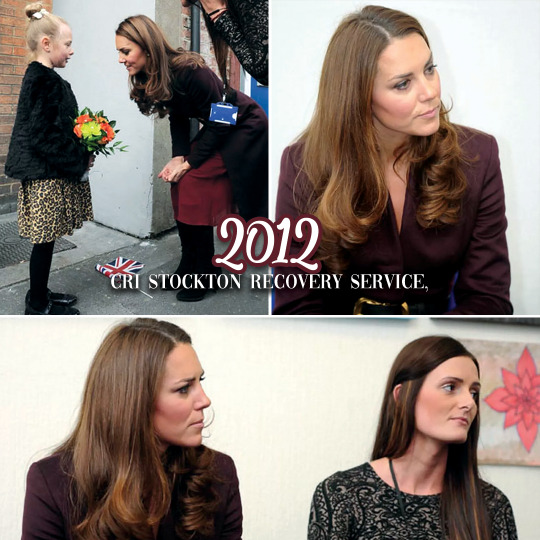







The Princess of Wales + World Mental Health Day events
2012 - The Duchess of Cambridge visited CRI Stockton Recovery Service, in Stockton-on-Tees, to meet families working with Action on Addiction’s M-PACT program, “Moving Parents and Children Together”
2015 - The Duke and Duchess of Cambridge visited Harrow College to take part in events for World Mental Health Day
2016 - The Duke and Duchess of Cambridge and Prince Harry travelled to County Hall, London, for a reception for representatives from the charities working under Heads Together
2017 - The Duke and Duchess of Cambridge and Prince Harry hosted a reception at Buckingham Palace for World Mental Health Day
2018 - The day before World Mental Health Day, the Duke and Duchess of Cambridge visited the first Global Ministerial Mental Health Summit
2019 - The Duke and Duchess of Cambridge and The Duke and Duchess of Sussex voiced a campaign video launched by the NHS which raises awareness of an online service to help people who are struggling, Every Mind Matters
2020 - Four days before World Mental Health Day, the Duchess of Cambridge visited the University of Derby to hear how the pandemic has impacted university life and learn about the measures put in place to support student mental health
2022 - The Prince and Princess of Wales presented a special episode of "Newsbeat", where they discussed the stigmas surrounding mental health, the pressures of social media and ways to equip young people with the tools to open up about how they’re feeling with four young campaigners
2023 - The Prince and Princess of Wales hosted "Exploring our Emotional Worlds", a forum for 100 young people in Birmingham, in honour of World Mental Health Day
#mine#royaltyedit#kate#stockton#wmhd 15#wmhd 16#wmhd 17#gmhs 18#covid19: every mind matters#derby20#wmhd22#wmhd23
26 notes
·
View notes
Text
Cell Phone Addiction | Mental Health - Wings WIthin
Mobile addiction is a growing concern. It is easy to get addicted to mobile phones but hard to overcome it. Numerous people around the world are addicted to their mobile phones. The behavior pattern of mobile addicts is more or less the same.
The cell phone is one of the most significant discoveries of the 20th century. According to recent statistics, over 50 crore Indians are using cell phones. While it is true that the advancement of technology has led to many conveniences in our world, it has also brought many other critical issues to us.
Addiction is a chronic disease and is one of the most intractable health disorders faced around the world. Cell phone addiction is a thriving concern. It is very easy to get addicted to cell phones but difficult to subdue them. A lot of people globally are addicted to their mobile phones.
NewGen social isolation:
A majority of youths of this generation have become socially isolated because they avoid connecting with people. Thanks to the technology that has turned a vast majority of human beings into impudent fellows. Today, due to cell phone addiction youth tend not to care about their neighbors rather they are more concerned about their online friends across the miles. The internet is a network of online connected servers, desktop computers, laptops and cell phones and societies have no choice than being a part of this network. We keep chasing success when every step of our journey is a success in itself.
The need of the hour is to guide the kids, students and teens from childhood itself about the disadvantages of the internet. People only post the positive side of their lives including travel, job promotion, lavish dinners with friends, although we are aware that what we see on social media is not completely true. Still it affects us because we end up comparing ourselves with online friends’ standard of living. Either we try to make quick, temporary changes in our lifestyle to feel better or we make an effort to appear better on social media to keep up with our peers. The negative use of the internet in the society is only possible when people don’t know how to use, when to use, what to communicate and what shouldn’t be. People are so deeply involved in the web of the internet that they have no time to spend with their family, friends and relatives which is resulting in losing the social connect leading to them to isolation.
This condition of being alone increases the risk of mental health problems, negatively impacts the development of the brain’s structure, mental health issues such as depression, dementia, social anxiety and low self-esteem. In severe cases, feeling of helplessness, hopelessness and worthlessness are exact rebated by our isolation and suicidal tendencies increases. To overcome isolation we need to change our habits and behavior. One can try and engage with family and friends, join a group, talk about it with a therapist. After all, all we need is a healthy social network.
Cell phone addiction, What causes it?
The causes of cell phone addiction are numerous. Cell phones are eating the brains of the younger generation through addiction. The main reasons of cell phone addictions are as follows:
Availability of internet: Internet makes things simpler nowadays and will help us to find anything and everything. The Internet is the major factor which provokes people to use cell phones or smartphones more and more.
Functionalities: Cell Phones provide a wide variety of functions or features to its users. Most of the people check their phone for messages and calls if there is no vibration or ring which is in turn termed as addiction.
Gaming: Video games available on the cell phones or smartphones compel the users to use them more. In the modern cell phone/ smartphone market, gaming is shown as an important feature of the phone which has the capability of poisoning the users.
Signs and symptoms that clearly show that a person is addicted to his/ her mobile phone.
You display ritualistic behaviors around your phone. Examples of this may be checking your phone throughout the night when you wake up. Taking your phone to bed until you fall asleep. Checking your phone first thing in the morning as soon as you open your eyes and frequently being caught up in activities on your phone that you struggle to stop.
Spends more time connecting online than connecting with people in real life.
Neglect or trouble completing duties at work, school, or home.
Sleeps with the smartphone on or under the pillow.
Checking peoples’ profiles repeatedly due to anxiety.
Accidents or injury due to phone use while driving.
Appears anxious when the phone battery is low.
Has his or her mobile phone on the table during meals.
Angry or irritated if phone use is interrupted.
Disturbed sleep because of getting up at night to check phone.
Reaching for the phone the moment they are alone or bored.
Phantom vibrations (thinking the phone buzzes when it doesn’t).
Craving access to a smartphone or another device.
FOMO- Fear of missing out.
Loss of control over the behavior.
Panics if cell phone is misplaced or service is unavailable.
The thought of losing your smartphone genuinely terrifies you.
You obsessively check your phone even when there are no notification noises
Others have expressed resentment or upset at the amount you use your phone
You neglect your family and friends and struggle to stay present in favor of using your phone.
Withdrawal, feeling irritated and anxious when the behavior isn’t practiced.
Relapse, picking up the habit again after periods of avoidance.
Mental Health Issues of cell phone addiction.
Undoubtedly, smartphones have become integrated into our everyday lives. When you’re glued to your phone, you miss out on quality time with friends or family and exciting experiences. There are other negative effects of excessive cell phone usage, including the following:
-Insomnia
-Poor school/college performances
-Poor work performance
-Loss of interest in activities
-Reduced attention and productivity
-Depression
-Contributes to relationship stress
-Anxiety
How do you break a cell phone addiction:
Mobile phones have been created for our convenience. We must limit their usage to take charge of our lives. If you feel you are getting addicted to your mobile phone then look for ways to get rid of it. When you set healthy boundaries between yourself and your cell phone, you’re more likely to avoid smartphone addiction.
To break cell phone addiction take a ‘Screen Fast’ by:-
Keeping yourself on a schedule.
Turn off as many push notifications as possible.
Take distracting apps off your home screen.
Kick your device out of bed.
If you have a smart speaker, put it to use.
Try turning on your phone's grayscale.
Stay accountable.
Set rules around your daily smartphone use.
Make your smartphone less appealing.
Practice phone etiquette
Keep phones off the table.
Designate “no cell” zones in your home
Conclusion:
Mobile addiction is more serious than what we think. People addicted to mobile phones show all or some of the above mentioned symptoms. It is important to take these signs seriously. Mobile addiction can ruin our life if it is not stopped on time. Getting rid of this habit may be difficult but it is not impossible. As much as we neglect it, mobile addiction has become a big problem today. It is hampering our professional life and ruining our personal relationships. Mobile phones are causing more harm than good.
People experiencing the problem of mobile addiction must make an effort to get rid of it and return to the real world. To overcome mobile addiction we need to change our habits and behavior. We must help our loved ones going through this problem. We can help them by talking to them about this problem without being judgmental. Express empathy and be open to their negative reactions. It is difficult to cope up with this problem, but the support from family and friends can be really helpful in overcoming mobile addiction. If this does not help, you should not hesitate to seek professional help. Talk about it with a therapist. After all, all we need is a healthy social network. Source: https://www.wingswithin.in/article/cell-phone-addiction
3 notes
·
View notes
Text
UNI STUDENTS HELP A FELLOW UNI STUDENT OUT
I need to do a research for one of my classes regarding social media usage and its correlation to uni students' mental health.
It's pretty short, will take only two minutes!!
Please reblog so more people could see it and respond, I'll be forever grateful <3
#university#uni#student#survey#questionnaire#mental health#social media#dark academia#please please please please please please please please please
7 notes
·
View notes